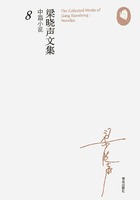“Extraordinary!”continued the chemist. “But it might be that theapricots had brought on the syncope. Some natures are so sensitive to certainsmells; and it would even be a very fine question to study both in itspathological and physiological relation. The priests know the importance of it,they who have introduced aromatics into all their ceremonies. It is to stupefythe senses and to bring on ecstasies-a thing, moreover, very easy in persons ofthe weaker ***, who are more delicate than the other. Some are cited who faintat the smell of burnt hartshorn, of new bread-”
“Take care; you'llwake her!” said Bovary in a low voice.
“And not only,” thedruggist went on, “are human beings subject to suchanomalies, but animals also. Thus you are not ignorant of the singularlyaphrodisiac effect produced by the Nepeta Cataria, vulgarly called catmint, onthe feline race; and, on the other hand, to quote an example whose authenticityI can answer for. Bridaux (one of my old comrades, at present established inthe Rue Malpalu) possesses a dog that falls into convulsions as soon as youhold out a snuff-box to him. He often even makes the experiment before hisfriends at his summer-house at Guillaume Wood. Would anyone believe that asimple sternutation could produce such ravages on a quadrupedal organism? It isextremely curious, is it not?”
“Yes,” said Charles,who was not listening to him.
“This shows us,” wenton the other, smiling with benign self-sufficiency, “theinnumerable irregularities of the nervous system. With regard to madame, shehas always seemed to me, I confess, very susceptible. And so I should by nomeans recommend to you, my dear friend, any of those so-called remedies that,under the pretence of attacking the symptoms, attack the constitution. No; nouseless physicking! Diet, that is all; sedatives, emollients, dulcification.Then, don't you think that perhaps her imaginationshould be worked upon?”
“In what way? How?”said Bovary.
“Ah! that is it. Such is indeed the question.‘That is the question,' as Ilately read in a newspaper.”
But Emma, awaking, cried out-
“The letter! the letter!”
They thought she was delirious; and she wasby midnight. Brain-fever had set in.
For forty-three days Charles did not leaveher. He gave up all his patients; he no longer went to bed; he was constantlyfeeling her pulse, putting on sinapisms and cold-water compresses. He sentJustin as far as Neufchatel for ice; the ice melted on the way; he sent himback again. He called Monsieur Canivet into consultation; he sent for Dr.Lariviére, his old master, from Rouen; he was indespair. What alarmed him most was Emma's prostration,for she did not speak, did not listen, did not even seem to suffer, as if herbody and soul were both resting together after all their troubles.
About the middle of October she could sit upin bed supported by pillows. Charles wept when he saw her eat her firstbread-and-jelly. Her strength returned to her; she got up for a few hours of anafternoon, and one day, when she felt better, he tried to take her, leaning onhis arm, for a walk round the garden. The sand of the paths was disappearingbeneath the dead leaves; she walked slowly, dragging along her slippers, andleaning against Charles's shoulder. She smiled all thetime.
They went thus to the bottom of the gardennear the terrace. She drew herself up slowly, shading her eyes with her hand tolook. She looked far off, as far as she could, but on the horizon were onlygreat bonfires of grass smoking on the hills.
“You will tire yourself, my darling!” said Bovary. And, pushing her gently to make her go into thearbour, “Sit down on this seat; you'll be comfortable.”
“Oh! no; not there!”she said in a faltering voice.
She was seized with giddiness, and from thatevening her illness recommenced, with a more uncertain character, it is true,and more complex symptoms. Now she suffered in her heart, then in the chest,the head, the limbs; she had vomitings, in which Charles thought he saw thefirst signs of cancer.
And besides this, the poor fellow was worriedabout money matters.
Chapter 14
To begin with, he did not know how he couldpay Monsieur Homais for all the physic supplied by him, and though, as amedical man, he was not obliged to pay for it, he nevertheless blushed a littleat such an obligation. Then the expenses of the household, now that the servantwas mistress, became terrible. Bills rained in upon the house; the tradesmengrumbled; Monsieur Lheureux especially harassed him. In fact, at the height ofEmma's illness, the latter, taking advantage of thecircumstances to make his bill larger, had hurriedly brought the cloak, the travelling-bag,two trunks instead of one, and a number of other things. It was very well forCharles to say he did not want them. The tradesman answered arrogantly thatthese articles had been ordered, and that he would not take them back; besides,it would vex madame in her convalescence; the doctor had better think it over;in short, he was resolved to sue him rather than give up his rights and takeback his goods. Charles subsequently ordered them to be sent back to the shop.Félicité forgot; he had otherthings to attend to; then thought no more about them. Monsieur Lheureuxreturned to the charge, and, by turns threatening and whining, so managed thatBovary ended by signing a bill at six months. But hardly had he signed thisbill than a bold idea occurred to him: it was to borrow a thousand francs fromLheureux. So, with an embarrassed air, he asked if it were possible to getthem, adding that it would be for a year, at any interest he wished. Lheureuxran off to his shop, brought back the money, and dictated another bill, bywhich Bovary undertook to pay to his order on the 1 st of September next thesum of one thousand and seventy francs, which, with the hundred and eightyalready agreed to, made just twelve hundred and fifty, thus lending at six per centin addition to one-fourth for commission: and the things bringing him in a goodthird at the least, this ought in twelve months to give him a profit of ahundred and thirty francs. He hoped that the business would not stop there;that the bills would not be paid; that they would be renewed; and that his poorlittle money, having thriven at the doctor's as at ahospital, would come back to him one day considerably more plump, and fatenough to burst his bag.
Everything, moreover, succeeded with him. He wasadjudicator for a supply of cider to the hospital at Neufchatel; MonsieurGuillaumin promised him some shares in the turf-pits of Gaumesnil, and hedreamt of establishing a new diligence service between Arcueil and Rouen, whichno doubt would not be long in ruining the ramshackle van of the “Lion d'Or,” andthat, travelling faster, at a cheaper rate, and carrying more luggage, wouldthus put into his hands the whole commerce of Yonville.
Charles several times asked himself by whatmeans he should next year be able to pay back so much money. He reflected,imagined expedients, such as applying to his father or selling something. Buthis father would be deaf, and he - he had nothing to sell. Then he foresaw suchworries that he quickly dismissed so disagreeable a subject of meditation fromhis mind. He reproached himself with forgetting Emma, as if, all his thoughtsbelonging to this woman, it was robbing her of something not to be constantlythinking of her.
The winter was severe, Madame Bovary's convalescence slow. When it was fine they wheeled her arm-chair tothe window that overlooked the square, for she now had an antipathy to thegarden, and the blinds on that side were always down. She wished the horse tobe sold; what she formerly liked now displeased her. All her ideas seemed to belimited to the care of herself. She stayed in bed taking little meals, rang forthe servant to inquire about her gruel or to chat with her. The snow on themarket-roof threw a white, still light into the room; then the rain began tofall; and Emma waited daily with a mind full of eagerness for the inevitablereturn of some trifling events which nevertheless had no relation to her. Themost important was the arrival of the “Hirondelle” in the evening. Then the landlady shouted out, and other voicesanswered, while Hippolyte's lantern, as he fetched theboxes from the boot, was like a star in the darkness. At mid-day Charles camein; then he went out again; next she took some beef-tea, and towards five o'clock, as the day drew in, the children coming back from school,dragging their wooden shoes along the pavement, knocked the clapper of theshutters with their rulers one after the other.
It was at this hour that Monsieur Bournisiencame to see her. He inquired after her health, gave her news, exhorted her toreligion, in a coaxing little prattle that was not without its charm. The merethought of his cassock comforted her.
One day, when at the height of her illness,she had thought herself dying, and had asked for the communion; and, while theywere ****** the preparations in her room for the sacrament, while they wereturning the night table covered with syrups into an altar, and while Félicité was strewing dahlia flowers on thefloor, Emma felt some power passing over her that freed her from her pains,from all perception, from all feeling. Her body, relieved, no longer thought;another life was beginning; it seemed to her that her being, mounting towardGod, would be annihilated in that love like a burning incense that melts intovapour. The bed-clothes were sprinkled with holy water, the priest drew fromthe holy pyx the white wafer; and it was fainting with a celestial joy that sheput out her lips to accept the body of the Saviour presented to her. Thecurtains of the alcove floated gently round her like clouds, and the rays ofthe two tapers burning on the night-table seemed to shine like dazzling halos.Then she let her head fall back, fancying she heard in space the music ofseraphic harps, and perceived in an azure sky, on a golden throne in the midstof saints holding green palms, God the Father, resplendent with majesty, whowith a sign sent to earth angels with wings of fire to carry her away in theirarms.
This splendid vision dwelt in her memory asthe most beautiful thing that it was possible to dream, so that now she stroveto recall her sensation. That still lasted, however, but in a less exclusivefashion and with a deeper sweetness. Her soul, tortured by pride, at lengthfound rest in Christian humility, and, tasting the joy of weakness, she sawwithin herself the destruction of her will, that must have left a wide entrancefor the inroads of heavenly grace. There existed, then, in the place ofhappiness, still greater joys - another love beyond all loves, without pauseand without end, one that would grow eternally! She saw amid the illusions ofher hope a state of purity floating above the earth mingling with heaven, towhich she aspired. She wanted to become a saint. She bought chaplets and woreamulets; she wished to have in her room, by the side of her bed, a reliquaryset in emeralds that she might kiss it every evening.
The curé marvelled atthis humour, although Emma's religion, he thought,might, from its fervour, end by touching on heresy, extravagance. But not beingmuch versed in these matters, as soon as they went beyond a certain limit hewrote to Monsieur Boulard, bookseller to Monsignor, to send him “something good for a lady who was very clever.” The bookseller, with as much indifference as if he had been sendingoff hardware to niggers, packed up, pellmell, everything that was then thefashion in the pious book trade. There were little manuals in questions andanswers, pamphlets of aggressive tone after the manner of Monsieur de Maistre,and certain novels in rose-coloured bindings and with a honied style,manufactured by troubadour seminarists or penitent blue-stockings. There werethe “Think of it,” “the Man ofthe World at Mary's Feet, by Monsieur de, decoratedwith many Orders;” “The Errors of Voltaire, for the Useof the Young”, etc.
Madame Bovary's mindwas not yet sufficiently clear to apply herself seriously to anything;moreover, she began this reading in too much hurry. She grew provoked at thedoctrines of religion; the arrogance of the polemic writings displeased her bytheir inveteracy in attacking people she did not know; and the secular stories,relieved with religion, seemed to her written in such ignorance of the world,that they insensibly estranged her from the truths for whose proof she waslooking. Nevertheless, she persevered; and when the volume slipped from herhands, she fancied herself seized with the finest Catholic melancholy that anethereal soul could conceive.
As for the memory of Rodolphe, she had thrustit back to the bottom of her heart, and it remained there more solemn and moremotionless than a king's mummy in a catacomb. Anexhalation escaped from this embalmed love, that, penetrating througheverything, perfumed with tenderness the immaculate atmosphere in which she longedto live. When she knelt on her Gothic prie-Dieu, she addressed to the Lord thesame suave words that she had murmured formerly to her lover in the outpouringsof *****ery. It was to make faith come; but no delights descended from theheavens, and she arose with tired limbs and with a vague feeling of a giganticdupery.
This searching after faith, she thought, wasonly one merit the more, and in the pride of her devoutness Emma comparedherself to those grand ladies of long ago whose glory she, had dreamed of overa portrait of La Valliére, and who, trailing with somuch majesty the lace-trimmed trains of their long gowns, retired intosolitudes to shed at the feet of Christ all the tears of hearts that life hadwounded.
Then she gave herself up to excessivecharity. She sewed clothes for the poor, she sent wood to women in childbed;and Charles one day, on coming home, found three good-for-nothings in thekitchen seated at the table eating soup. She had her little girl, whom duringher illness her husband had sent back to the nurse, brought home. She wanted toteach her to read; even when Berthe cried, she was not vexed. She had made upher mind to resignation, to universal indulgence. Her language about everythingwas full of ideal expressions. She said to her child, “Isyour stomach-ache better, my angel?”
Madame Bovary senior found nothing to censureexcept perhaps this mania of knitting jackets for orphans instead of mendingher own house-linen; but, harassed with domestic quarrels, the good woman tookpleasure in this quiet house, and she even stayed there till after Easter, toescape the sarcasms of old Bovary, who never failed on Good Friday to orderchitterlings.
Besides the companionship of hermother-in-law, who strengthened her a little by the rectitude of her judgmentand her grave ways, Emma almost every day had other visitors. These were MadameLanglois, Madame Caron, Madame Dubreuil, Madame Tuvache, and regularly from twoto five o'clock the excellent Madame Homais, who, forher part, had never believed any of the tittle-tattle about her neighbour. Thelittle Homais also came to see her; Justin accompanied them. He went up withthem to her bedroom, and remained standing near the door, motionless and mute.Often even Madame Bovary; taking no heed of him, began her toilette. She beganby taking out her comb, shaking her head with a quick movement, and when he forthe first time saw all this mass of hair that fell to her knees unrolling inblack ringlets, it was to him, poor child! like a sudden entrance intosomething new and strange, whose splendour terrified him.
Emma, no doubt, did not notice his silentattentions or his timidity. She had no suspicion that the love vanished fromher life was there, palpitating by her side, beneath that coarse holland shirt,in that youthful heart open to the emanations of her beauty. Besides, she nowenveloped all things with such indifference, she had words so affectionate withlooks so haughty, such contradictory ways, that one could no longer distinguishegotism from charity, or corruption from virtue. One evening, for example, shewas angry with the servant, who had asked to go out, and stammered as she triedto find some pretext. Then suddenly-
“So you love him?”she said.
And without waiting for any answer from Félicité, who was blushing, she added, “There! run along; enjoy yourself!”
In the beginning of spring she had the gardenturned up from end to end, despite Bovary'sremonstrances. However, he was glad to see her at last manifest a wish of anykind. As she grew stronger she displayed more wilfulness. First, she foundoccasion to expel Mbre Rollet, the nurse, who during her convalescence hadcontracted the habit of coming too often to the kitchen with her two nurslingsand her boarder, better off for teeth than a cannibal. Then she got rid of theHomais family, successively dismissed all the other visitors, and evenfrequented church less assiduously, to the great approval of the druggist, whosaid to her in a friendly way-
“You were going in a bit for the cassock!”
As formerly, Monsieur Bournisien dropped inevery day when he came out after catechi** class. He preferred staying out ofdoors to taking the air “in the grove,” as he called the arbour. This was the time when Charles came home.They were hot; some sweet cider was brought out, and they drank together tomadame's complete restoration.
Binet was there; that is to say, a littlelower down against the terrace wall, fishing for crayfish. Bovary invited himto have a drink, and he thoroughly understood the uncorking of the stonebottles.
“You must,” he said,throwing a satisfied glance all round him, even to the very extremity of thelandscape, “hold the bottle perpendicularly on thetable, and after the strings are cut, press up the cork with little thrusts,gently, gently, as indeed they do seltzer-water at restaurants.”
But during his demonstration the cider oftenspurted right into their faces, and then the ecclesiastic, with a thick laugh,never missed this joke:
“Its goodness strikes the eye!”
He was, in fact, a good fellow and one day hewas not even scandalised at the chemist, who advised Charles to give madamesome distraction by taking her to the theatre at Rouen to hear the illustrioustenor, Lagardy. Homais, surprised at this silence, wanted to know his opinion,and the priest declared that he considered music less dangerous for morals thanliterature.
But the chemist took up the defence ofletters. The theatre, he contended, served for railing at prejudices, and,beneath a mask of pleasure, taught virme.
“Castigat ridendo mores, Monsieur Bournisien!Thus consider the greater part of Voltaire's tragedies;they are cleverly strewn with philosophical reflections, that made them a vastschool of morals and diplomacy for the people.”
“I,” said Binet, “once saw a piece called the Gamin de Paris, in which there was thecharacter of an old general that is really hit off to a T. He sets down a youngswell who had seduced a working girl, who at the ending -”
“Certainly,”continued Homais, “there is bad literature as there isbad pharmacy, but to condemn in a lump the most important of the fine artsseems to me a stupidity, a Gothic idea, worthy of the abominable times thatimprisoned Galileo.”
“I know very well,”objected the curé, “that thereare good works, good authors. However, if it were only those persons ofdifferent ***es united in a bewitching apartment, decorated rouge, thoselights, those effeminate voices, all this must, in the long-run, engender acertain mental libertinage, give rise to immodest thoughts and impuretemptations. Such, at any rate, is the opinion of all the Fathers. Finally,” he added, suddenly assuming a mystic tone of voice while he rolleda pinch of snuff between his fingers, “if the Churchhas condemned the theatre, she must be right; we must submit to her decrees.”
“Why,” asked thedruggist, “should she excommunicate actors? Forformerly they openly took part in religious ceremonies. Yes, in the middle ofthe chancel they acted; they performed a kind of farce called Mysteries, whichoften offended against the laws of decency.”
The ecclesiastic contented himself withuttering a groan, and the chemist went on-
“It's like it is inthe Bible; there there are, you know, more than one piquant detail, mattersreally libidinous!”
And on a gesture of irritation from MonsieurBournisien-
“Ah! you'll admitthat it is not a book to place in the hands of a young girl, and I should besorry if Athalie-”
“But it is the Protestants, and not we,” cried the other impatiently, “who recommendthe Bible.”
“No matter,” saidHomais. “I am surprised that in our days, in thiscentury of enlightenment, anyone should still persist in proscribing anintellectual relaxation that is inoffensive, moralising, and sometimes evenhygienic; is it not, doctor?”
“No doubt,” repliedthe doctor carelessly, either because, sharing the same ideas, he wished tooffend no one, or else because he had not any ideas.













